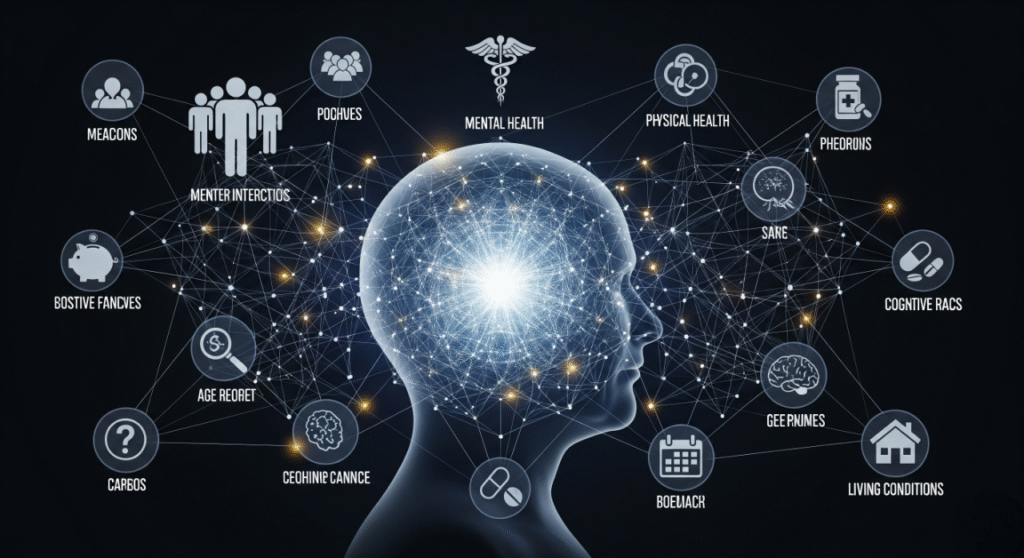Recognizing depression in elderly can be tricky. Unlike younger adults, seniors might not express sadness directly. Instead, signs of depression in elderly can manifest differently, often mimicking other health issues or simply being dismissed as “part of aging.” It’s crucial to look beyond common stereotypes.
Common indicators include:
- Persistent sadness or feelings of emptiness: While less overtly expressed, this is a core symptom.
- Loss of interest or pleasure in activities: This is known as anhedonia. A senior might stop engaging in hobbies they once loved.
- Changes in appetite or weight: Unexplained weight loss or gain can be a red flag.
- Sleep disturbances: Insomnia, waking up too early, or excessive sleeping.
- Irritability or restlessness: Instead of sadness, some seniors become more irritable or agitated.
- Fatigue and loss of energy: Feeling constantly tired, even after rest.
- Feelings of worthlessness or guilt: Over-focusing on past mistakes or feeling like a burden.
- Difficulty concentrating, remembering, or making decisions: This can sometimes be mistaken for early signs of cognitive decline.
- Physical aches and pains: Unexplained headaches, digestive problems, or chronic pain that doesn’t respond to treatment can be symptoms.
- Social withdrawal: Avoiding friends, family, or social gatherings.
It’s important to differentiate between temporary “blues” or grief from life events and persistent signs of depression. If these symptoms last for more than two weeks and interfere with daily life, it’s time to seek professional help. Early recognition is key to effective geriatric depression treatment.
2. The Complex Web: Causes and Risk Factors

Depression in elderly rarely stems from a single cause. Instead, it’s often a confluence of psychological, social, and physical factors unique to the aging process. Understanding these can guide effective elderly psychological support.
Key contributing factors include:
- Psychosocial Adjustments: Adapting to significant life changes like retirement, loss of a spouse, friends, or social roles can be incredibly challenging. Feelings of isolation, existential regrets, and a diminished sense of purpose can contribute to senior emotional health decline. The “retirement blues” are a real phenomenon where the loss of daily structure and social interaction can lead to feelings of emptiness. To explore ways to build stronger connections in later life, read our article: “Connect and Thrive: Essential Tips for Building Vibrant Social Ties in Retirement“.
- Chronic Health Conditions: There’s a strong bidirectional link between physical and mental health. Chronic illnesses like heart disease, diabetes, stroke, cancer, or Parkinson’s disease can increase the risk of depression. The pain, functional limitations, and necessary lifestyle changes associated with these conditions take a significant toll. For instance, geriatrics and mental health professionals often see how cardiovascular disease can exacerbate depressive symptoms and vice-versa.
- Medication Side Effects and Polypharmacy: Older adults often take multiple medications for various conditions (polypharmacy). The interactions between these drugs or their side effects can mimic or cause symptoms of depression. Age-related physiological changes affect how the body absorbs, distributes, metabolizes, and excretes medications, making seniors more susceptible to adverse effects.
- Social Isolation: Reduced social contact due to mobility issues, loss of friends, or family living far away can lead to profound loneliness. Lack of elderly support networks is a major risk factor for depression.
- Cognitive Changes: While not directly causing depression, conditions like mild cognitive impairment or early-stage dementia can lead to frustration, anxiety, and depression due to memory loss and confusion.
- Lifestyle Factors: Poor nutrition (leading to eating disorders in elderly or simply insufficient nutrients), inadequate sleep, and physical inactivity significantly impact mental wellness.
3. Hope and Healing: Effective Treatment Approaches

Hope and Healing: Effective Treatment Approaches
The good news is that depression in elderly is highly treatable. A multi-faceted approach, often involving a team of professionals, yields the best outcomes. The goal is to empower the individual and restore their quality of life in old age.
Effective treatment strategies include:
- Therapy (Psychotherapy): Talking therapies, such as cognitive-behavioral therapy (CBT) or interpersonal therapy (IPT), are highly effective. A psychologist for seniors can help individuals process grief, adapt to life changes, develop coping mechanisms, and challenge negative thought patterns. These therapies encourage autonomy and empowerment, helping seniors regain control over their emotional lives. To find qualified therapists, consult directories of reputable psychology or mental health associations.
- Medication: Antidepressants can be effective for moderate to severe depression. However, due to age-related physiological changes, dosages and types of medication need to be carefully managed by a doctor, often a geriatrician or psychiatrist specializing in older adults.
- Lifestyle Interventions:
- Exercise: Regular physical activity, even gentle forms like walking or chair exercises, is a powerful mood booster and promotes senior health. For more insights on staying active and healthy, explore our article: “Beyond Falls: Ways to Stay Healthy and Thrive in Your Active Senior Lifestyle”.
- Nutrition: A balanced diet plays a crucial role in brain health. Addressing issues like eating disorders in elderly or malnutrition can significantly improve mental state.
- Sleep Hygiene: Establishing healthy sleep routines is vital, as both short and long sleep durations are linked to mental health problems.
- Social Engagement: Actively combating isolation is paramount. Encouraging participation in social activities, community groups, volunteering, or even regular visits from family and friends can provide essential elderly support and connection.
- Occupational Therapy for Seniors: This can help individuals regain independence in daily activities, adapt to physical limitations, and find new purpose, which can significantly improve mood and self-esteem.
4. Beyond Dementia: Understanding Cognitive Changes
It’s important to distinguish between normal age-related cognitive changes and more serious conditions like dementia. While some slowing down in processing information or occasional forgetfulness is normal, significant memory loss, difficulty communicating, or disorientation are not. Understanding these differences can reduce anxiety and guide appropriate care, including how to cope with dementia in elderly.
Key points regarding cognitive changes:
- Normal Aging vs. Dementia: Normal aging might involve slower recall, but it doesn’t impair daily functioning significantly. Dementia, however, involves a progressive decline in cognitive function that interferes with everyday life.
- Psychological Changes in Dementia: Dementia can bring about personality changes, increased anxiety, bipolar disorder in elderly (though often a pre-existing condition exacerbated), depression, hallucinations, and agitation. These are often as challenging as the cognitive symptoms themselves.
- Modifiable Risk Factors for Dementia: Approximately 35% of dementia cases might be preventable by addressing modifiable risk factors throughout life. These include:
- Maintaining good cardiovascular health (managing hypertension, obesity, diabetes).
- Addressing hearing loss.
- Avoiding smoking.
- Staying physically active.
- Combating social isolation.
- Continuing education in adult life.
- Treating depression.
- Preventing traumatic brain injury.
Focusing on these areas is crucial for overall mental wellness and can play a role in Alzheimer’s prevention mental health. Para mais detalhes sobre fatores de risco modificáveis e prevenção, consulte o Alzheimer’s Association. If you’re looking for ways to maintain cognitive vitality, our article on “How to Keep Your Mind Sharp for Life: Science-Backed Strategies Busy Moms Can Start Today” offers broader strategies that can also be adapted.
👉 Depression in elderly is a prevalent yet treatable condition that demands our attention and understanding. It’s not a natural part of aging, and its impact on quality of life in old age can be profound if left unaddressed. By recognizing its unique signs, understanding its complex causes, and implementing a holistic approach to treatment and support, we can significantly improve the lives of our seniors.
Encouraging open conversations about senior mental health, seeking professional help, and fostering strong social connections are vital steps. With the right care and empathy, older adults can navigate the challenges of aging with resilience, maintaining their mental well-being for seniors and enjoying a fulfilling later life. If you or someone you know is struggling, reach out to a healthcare professional or elderly psychological support service. Help is available, and hope is always within reach.





